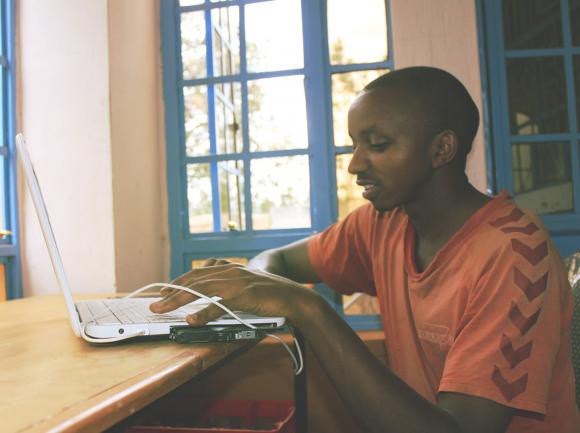
Contrary to the belief that agriculture is for the uneducated, 24 year old Alpha is a graduate of economics from the University of Nairobi. He chose to use his education to grow his farming business and work on youth development and empowerment projects.
“Growing up I always wanted to practise agriculture better than my dad did. As a young kid I used to plant my own vegetables. Whenever my dad would sell his vegetables, he would also sell the ones I grew as well. And then I would get the money which I saved or used for my needs,” he says.
As the manager of Alpham Fresh farm, Alpha keeps dairy cows, poultry and cultivates horticultural crops organically. Alpha has big dreams for his business; he wants it to grow into one of the leading agri-products companies in his county of Kiambu and even the country.
According to Alpha, the three biggest challenges African farmers like him face, are access to finance, technical support and information.
“Agriculture is a capital intensive venture and therefore requires sources of access to finances for expansion of the business. This has been difficult because financial institutions are charging high interest rates.”
“It is also difficult to access extension services, veterinary services among others. Finally, most farmers lack easy access to critical information such as disease outbreaks, prices of inputs and different inputs available.”
But teaming up with other farmers in the area, and getting online, have both changed the way that Alpha works.
“The internet has given me access to various platforms where I acquire knowledge and I am also able network with other farmers. Also, joining farmer associations has helped me a great deal. It has helped me to overcome the challenges of access to finances. Now that I am part of a savings in the group, I can access veterinary services from a veterinary doctor that is sourced and paid for by the group, as well as cheaper access to farm inputs sourced by the group.”

Contrary to the belief that agriculture is for the uneducated, 24 year old Alpha is a graduate of economics from the University of Nairobi. He chose to use his education to grow his farming business and work on youth development and empowerment projects.
“Growing up I always wanted to practise agriculture better than my dad did. As a young kid I used to plant my own vegetables. Whenever my dad would sell his vegetables, he would also sell the ones I grew as well. And then I would get the money which I saved or used for my needs,” he says.
As the manager of Alpham Fresh farm, Alpha keeps dairy cows, poultry and cultivates horticultural crops organically. Alpha has big dreams for his business; he wants it to grow into one of the leading agri-products companies in his county of Kiambu and even the country.
According to Alpha, the three biggest challenges African farmers like him face, are access to finance, technical support and information.
“Agriculture is a capital intensive venture and therefore requires sources of access to finances for expansion of the business. This has been difficult because financial institutions are charging high interest rates.”
“It is also difficult to access extension services, veterinary services among others. Finally, most farmers lack easy access to critical information such as disease outbreaks, prices of inputs and different inputs available.”
But teaming up with other farmers in the area, and getting online, have both changed the way that Alpha works.
“The internet has given me access to various platforms where I acquire knowledge and I am also able network with other farmers. Also, joining farmer associations has helped me a great deal. It has helped me to overcome the challenges of access to finances. Now that I am part of a savings in the group, I can access veterinary services from a veterinary doctor that is sourced and paid for by the group, as well as cheaper access to farm inputs sourced by the group.”
Alpha’s calls to action:
- Build communities that are resilient to climate change through resource mobilisation and policy frameworks to support livelihoods projects amongst the community members.
- Increase investments into agricultural development to enhance proper extension services, agricultural research, technological development, food productivity, rural infrastructure, plant and livestock improvement as well as access to financial support to small scale farmers for expansion.
- Increase international partnership efforts to combat effects of climate change such as floods and drought .
SDGs covered: SDG 1,2,3,8 and 10.
Find the original article on Farming First website.

